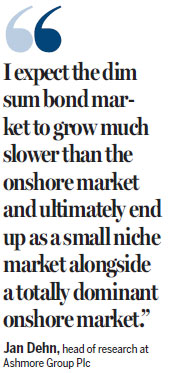Bull run likely to lift bonds, say bankers
Updated: 2015-04-29 07:10
By Celia Chen in Hong Kong(HK Edition)
|
|||||||
The renminbi-denominated bond market could catch the tailwind of the latest stock rally as investors seek to diversify risks by parking some of their gains in mainland high-yield debt securities, according to Hong Kong investment analysts.
"A bull market in stocks doesn't mean bonds will be left out," said Gordon Ip, senior fund manager at Value Partners Group Ltd - a Hong Kong investment house.
Mark Austen, chief executive officer at the Asia Securities Industry and Financial Markets Association, said from the point of view of a foreign investor, a rally in an equity market would prompt investors to rethink investment opportunities across the board, including bonds.
Patrick Shum Hing-hung, investment director at Tengard Fund Management, said: "It's reasonable for investors to buy some bonds for risk diversification."
But, of course, not all bonds are equal. Fund managers said investors should focus on high-yield renminbi-denominated bonds issued by mainland enterprises and stay away from US Treasury bonds, at least for now, because of expected interest-rate hikes later this year.
"The US Treasury bonds are not expected to increase amid concerns over the Fed's (US Federal Reserve) interest-rate rise," Shum said. The US 10-year Treasury yield is 1.92 percent, down 78 basis points from a year before. The yield for 5-year US government bonds is 1.43 percent, down 39 basis points.

Will Leung Chun-fai, head of investment strategy at Standard Chartered Bank (HK) Ltd, said he believes the pace and timing of the Fed in raising rates could have a significant impact on the performance of Hong Kong bonds.
As for dim sum bonds, which are bonds issued outside the mainland but denominated in renminbi, rather than the local currency, professionals said talk of the demise of this market is exaggerated but not entirely far-fetched.
When Hong Kong hosted the first dim sum bond sale in 2007, it opened the way for mainland enterprises to raise capital from overseas investors at lower costs than on the mainland.
But with the easing of controls on the flow of funds between the mainland and Hong Kong, the onshore bond market has become more active than before. In time, it can totally overshadow the offshore debt market, bankers said.
"I expect the dim sum bond market to grow much slower than the onshore market and ultimately end up as a small niche market alongside a totally dominant onshore market," said Jan Dehn, London-based head of research at Ashmore Group Plc, which manages $61 billion of assets globally and has a 3-billion yuan ($483.4 million) Renminbi Qualified Foreign Institutional Investor quota.
"It will end up trading with a liquidity premium over the onshore market as investors will strongly prefer the larger, more liquid onshore market," Dehn said.
Analysts from HSBC Holdings Plc and Standard Chartered Plc - the top two dim sum underwriters in the past four years - reckon that with a larger variety of notes and more familiar legal proceedings, Hong Kong's market will hold its own, especially when the central government aims to internationalize its currency.
celia@chinadailyhk.com
(HK Edition 04/29/2015 page8)